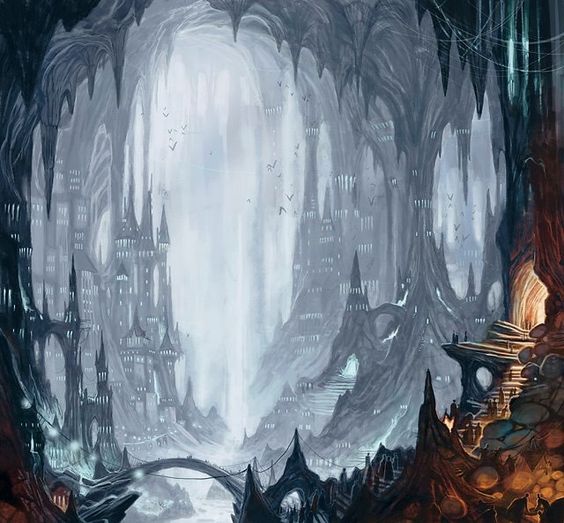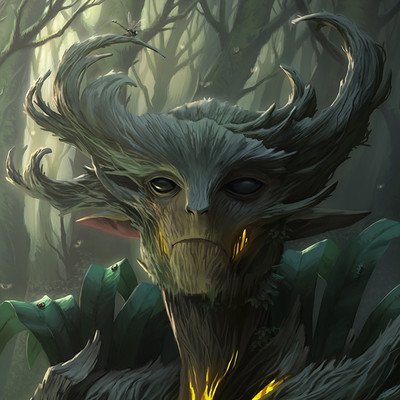You'd think people who talk so much about ghosts would be gloomy, but you'd be wrong.
Kharkorp is one of the largest city-states in the deeps, second only to the great city of
Mharaji in power and prestige. Kharkorp credit their fortunes to ancestors of old who guide them and are worshiped in the city as gods, giving it the name "City of Ancestors".
Depite its tomb-shrines and worship of bones, Kharkorp's third name is the City of a Thousand Festivals, for it is a place of color, noise and frantic energy.
Geography
Kharkorp sprawls across three major caverns that connect through a series of tunnels and pathways both natural and artificial. Most have been widened and reinforced by the city's sappers, to the point where the two caverns closest to each other have almost become one. A series of smaller caverns around the city proper hold a number of ranches, farms and slum-towns.
Some distance separate the two first caverns from the third and it has become the tomb-city. Much of the city consist of shrines and catacombs, where the dead outnumber the living. Those who live here are predominantly priests and their servants, slaves and families. It is here the great temples are kept and the sacrificial fires burn. The tombs here are ancient, dating so far back as the founding of the city and it is here the true seat of power of Kharkorp lies.
Some of the small caverns hold the very poorest of Kharkorp. While the city does not have a caste-system per se, those with ancestors whose act were heinous enough in life can find themselves shunned and hated generations after the fact. Such bloodlines are considered cursed and marriage into (or out of) such families difficult. Whether or not such bloodlines can be redeemed remain a matter of fierce theological debate, albeit waged far from the slums where such unfortunates are made to live.
So prevalent is this narrative of a ancestor-forsaken bloodline that it has become a common trope in Kharkorpian storytelling. There are many tales of horror where the cast can trace their misfortune to the sins inherited by blood. In most such tales, the fate they face is more often than not a grisly one.
City of Ancestors
In Kharkorp, ancestor worship is a central pillar of their society and culture. There are no gods in Kharkorp's religion of Hukama, or 'the Path of Our Elders', but with the ancestors watching over them the people of Kharkorp feel they need none. Every family of believers can easily recite their ancestral line down several generation and most keep a shrine to them in their home. The practice of
Shikei is common and the adorned skulls are given places of honor either in the homes or buried inside structures to consecrate them.
The Lost Elders
When a family-line ends and there is no one left to tend the shrines of their ancestor, the skulls left behind are claimed by the city. These 'lost elders' become part in particular of public works or fortification: with no family to watch over, they watch over the city-state as a whole.
In some cases, these ancestors are instead adopted by other families in elaborate rituals that bind the living to the dead. Almost every family who can afford to do so go through with at least one such adoption every now and then as a means to bolster their social status.
The people of Kharkorp defer to their ancestors on a great many things and it is the Speakers of the Hukama that channel those ancestors. But no matter how much they would wish it, the Speakers are not the only ones who communicate with the ancestors. Kharkorp is home to a vibrant tradition of folk-lore, of witches and warlocks both good and ill, of charms and superstitions. Try as they might, the Speakers have not been able to claim the ancestors all for themselves.
Culture
The people of Kharkorp are friendly and energetic. Theirs is a culture of a bewildering array of superstitions, taboos and traditions that seem to change from day to day to outsiders unfamiliar with the city. They are used to and comfortable with minimal personal space and visitors to the city are for the most part greeted warmly. Food and drink are important parts of their customs, with
Chnagahn particularly popular and important to the people of Kharkorp and one seem to be hosted at any given time for any number of reasons.
The people of Kharkorp place great value on the representation of things. Tattoos and scarification are popular to mark the passage of events, marking the body to demonstrate different things. Animals, monsters or natural forces are invoked in image and ritual for their symbolic attributes.
But no other tradition of representation is as obvious as that of the mask. To the people of Kharkorp, those who don the traditional masks are not merely disguising themselves but they are channeling the meaning of their mask, becoming hosts to powers beyond their own. The masked ruler of Kharkorp represents more than herself, but the combined will of the ancestors through her mask: she becomes their avatar.
Warrior, Trickster, Demon
The masks of Kharkorp come in an almost endless number, each with their own story and their own reason. Warriors don the mask of styled to resemble great beasts or legendary heroes to channel their might. During the Festival of Demons people don masks to become monsters and terrorize children and adults alike with their strange behavior and antics.
Government
The Masked may rule the living, but that is where his powers end.
— Alhiad, Kharkorp Slayer
Kharkorp is commanded by a ruler by the title of "the Masked", a monarch with absolute power vested in him or her by the favor of the ancestors. When such favor fails or the Masked dies and joins the rank of ancestors, the title and mask that makes them king is passed on. Each Masked make the last ruler part of their legacy, an unbroken line of guidance from the great beyond and the wisdom of the ancestors. Anything from parts of their skulls, to teeth or bone become part of the mask of the ruler.
In reality, while the Masked is the ruler of the city and does possess considerable political influence, their coronation and continued rule depend on the Speakers of Hukama. It is the Speakers who are able to divine who holds the favor the ancestors and more than one Masked have become the target of scathing condemnation from beyond the grave when they've acted against the Speakers or their interests.
The Speakers and the Masked share power. Some Masked are little more than mouth-pieces for the clergy, while others have engaged in cunning and vicious fights for power an autonomy. The current Masked is Tashkil Wasi, a former
Slayer. He is not the fanatic the Speakers believe him to be and he has spent his decade of rule quietly accumulating the means to make his own play for power.
Industry
Kharkorp is a wealthy city and home to a great deal of different industries. They are particularly well known for their exquisite craftsmanship with gold and precious gems, with jewelry from Kharkorp being highly sought after elsewhere in the deeps. Like most City-States, Kharkorp cannot supply all of its citizens with food and water with its own production, and have to import much from nearby villages and farming-estates. It does possess an abundance in mineral wealth and exports a great deal of metalwork.
The people of Kharkorp have also managed to corral and breed a rare breed of Khtam-sized scarabs they've come to call Ox-Scarab. The carapace left behind when the scarabs molt or are slain can be ground down into a fine powder that is a central component in an brilliant purple dye sometimes called Kharkorp Purple.
Kharkorp has always had problems keeping itself supplied with enough
Cave-Capped Hatter to make the hattick so much of the city needs. It is one of their largest import and the question of its supply have been used against them in the past.
Guilds & Factions
There are three major powers in Kharkorp: the Hukama, the nobles and the vast but disorganized "common folk" ancestral channelers. Each is locked in a struggle with the other over dominance, with the Masked playing all three factions in his attempt to secure his own power.
Read more about the Guilds& Factions in Kharkorp
The Slayers
The mask of a Slayer is always that of a Far Deep beast, sometimes said to be the one a Slayer has to bring down to earn their rank. While this is an exaggeration, the Slayers are still a formidable force under the command of the Hukama... Or so it seem.
A mixture of faith and carefully prepared mushroom make them utterly fearless on the battlefield. Unlike many warriors in Araea, who measure their martial worth in their own solitary prowess, Slayers always fight in pairs.
Read more about the Slayers
Military
Even before their current struggle, Kharkorp has always maintained a sizable force of mercenaries to guard their interests and punish their enemies. A smaller standing force exists within the city, supplemented again by a militia that serve both as police and defenders. The average militia is on per with any other in Araea - poorly trained, poorly equipped and poorly lead. However, the standing armed force of Kharkorp is decidedly better with good armor and good weapon, sometimes fashioned from cave beasts that are even better than steel, though this is usually reserved for champions and officers.
In desperate times, Kharkorp is able to call on a massive pool of manpower that can only be matched by
Mharaji and even then it is only barely. Despite their poor training, the average warrior from Kharkorp can not be faulted in terms of bravery.






1: Positive comment; Highly detailed and well crafted it gives the feeling of a city properly built up with culture and heritage 2: Negative comment; It reads a lot like a Dungeons & Dragons summary, not bad in itself but when it is in that style for whole paragraphs it can feel dragging. Though this is highly subjective 3: Question: Are all construction projects handled by soldiers? Being underground and inhabited by mostly clergy how do they get food, cloth and other goods? Do they have an export? If they have so many festivals is the main trade tourism? Do outsiders find the city scary or odd due to it's underground location and near obsession with the dead? How do they handle or prevent the diseases that can occur as a result of corpse decay? Is there a pest problem?
[QUOTE]Being underground and inhabited by mostly clergy how do they get food, cloth and other goods? Do they have an export?[/QUOTE] This seems to be addressed in the Industry section.. They trade gems, minerals, and dye (from giant beetles) for food and other goods.
Indeed: additionally, it is also only the Tomb-City that is mostly priests - and even then, they bring their families, servants ad slaves. Where did you get the impression that construction was handled by soldiers? The entire setting is set mostly underground, so Kharkorp is not exceptional there.
Could you elaborate on that? :)Creator of Araea, Megacorpolis, and many others.
Yep, all kinds of stuff! <3 As the entire setting is underground, they are all in a similar position.
Creator of Araea, Megacorpolis, and many others.